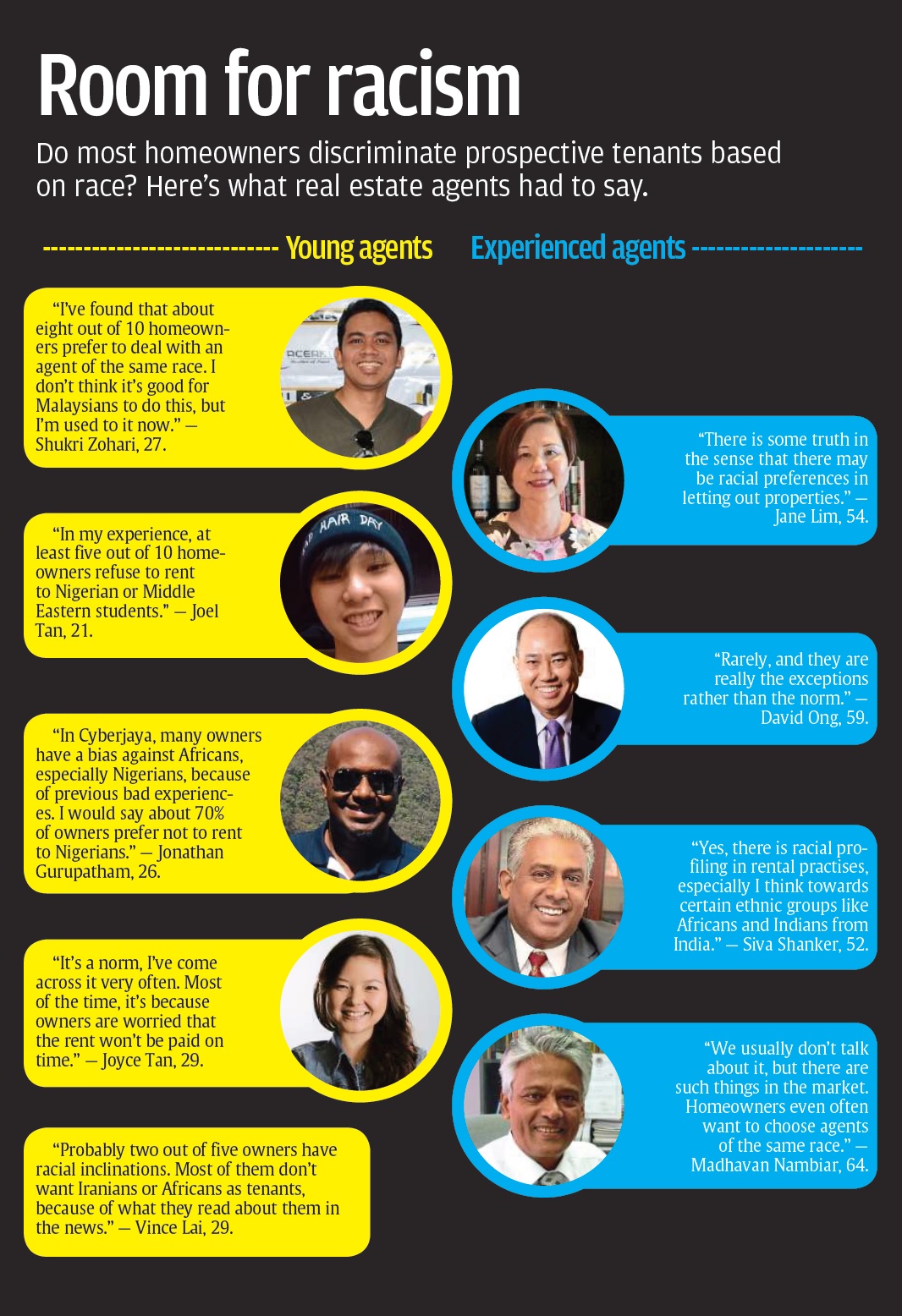WE published a story last month on how racial discrimination on the room/house rental market is affecting young Malaysians, and the response we received from readers was divided – homeowners defended the racial profiling as pragmatism, while young people railed against it.
Of course, there were also a couple of bigots who posted comments saying things like “Africans shouldn’t be allowed into the country”, but who cares what they say, right? The actual debate between (reasonable) homeowners and young prospective tenants was a fair one, with good arguments from both sides.
Read the original story: Room for Racism
Homeowners argued that they have a legal right to rent their properties to whomever they want, and since certain races have a reputation for being irresponsible tenants (especially those who’re still in college), they are simply protecting their properties by rejecting them.
Young people, however, said you can’t just paint everyone from a certain race with the same brush. Every individual should get a fair shot.
And caught right in the middle of that debate, were the real estate agents.
Most of the agents we spoke to acknowledged the problem and were sympathetic towards students struggling with it, but they also said there’s nothing much they can do because they have an obligation towards their clients, who have every right to protect their hard-earned property investments.
Younger agents, however, are hoping to change that.
Making a stand
One of them is Safrina Razak, 27, an agent with Azmi & Co Estate Agency who has many African friends struggling to find a place to stay in Malaysia. She’s now making a stand to support them.
“I put homeowners who don’t have racial preferences on my priority list and owners with racial preferences on my secondary list,” she said.
While Safrina gives blatantly-racist clients a taste of their own medicine, another young agent has found that persuasive qualities are key in converting people’s thinking.
“I don’t think it’s about taking a stand; it’s about how you convey a message. I prefer to talk to owners and convince them to take a chance on potential tenants of another race, then get the tenants in and let them prove the owners wrong,” said Jonathan Gurupatham, 26, from Umegar Realty.
Joel Tan, 21, of Chester Properties takes a more direct approach – he occasionally rebukes clients who racially profile prospective tenants.
“I tend to voice my disapproval a bit, by just making a comment or two about the homeowners being narrow-minded,” he said.
Although these young agents are trying to change the harsh realities of the situation in their own small ways, other young agents say taking a stand can be much harder than it seems.
“I’m kind of disappointed that this has become the norm and I don’t think it’s a healthy situation, but I think if I took a stand against owners with racial preferences, it would affect my job prospects,” said Vince Lai, 29, an agent with The Peak Realty.
Joyce Tan, 29, of Hartamas Real Estate, agreed that there’s only so much young agents starting out in the industry can do.
“These properties don’t belong to us, so we can’t dictate the terms,” she said. “Plus, our work is based on commission. The clients pay us, so we can’t be too difficult.”
Harsh realty
While young agents are hopeful of making a positive impact, seasoned agents seemed less optimistic about turning things around.
“Agents are not in a position of strength. If you won’t take someone’s business, there are many other agents out there who will,” said Madhavan Nambiar, 64, principal of Countrywide Properties.
Malaysian Institute of Estate Agents president Siva Shanker is adamant that while most estate agents abhor racism, many are forced to forsake their principles in order to make a living.
“Across the board, agents hate racism and are angry, fed-up and constantly complaining about it but if we wanted to be righteous, there would be no work. So we’re forced to compromise on principles,” he said.
In fact, some of them complained that clients often prefer to work with agents who are of the same race.
David Ong, 59, founder of industry giants Reapfield, added: “As agents, it is difficult for us because it is our fiduciary responsibility to carry out our client’s instructions.”
On the other hand, Jane Lim, 54, principal of The Peak Realty, believes change is possible – but only if the public becomes invested in the cause, not just real estate agents.
“Changing the market situation will take time. It’s pretty difficult as everyone takes care of their own interests. Until there is a better playing field for everyone, we all just have to deal with it,” she said.
What students should do
Now to the crux of this issue: what can students do if they can’t rent a place because people of their race have a bad rep?
Lim said students have to face up to the reality of the situation, manage their expectations and be prepared to face rejection before going on a room-hunt.
With that in mind, Joyce said that if a homeowner rejects you because they think you will be an irresponsible tenant and ruin his/her house, you can offer to pay a higher security deposit.
“That way, the owner knows that if you do end up damaging the place, he can use your deposit to pay for repairs.
“It’s not exactly fair, because why should one race have to pay a higher deposit? But if you really need the place, doing this might help,” she said. And the good thing is, if you really are a good tenant and no major repairs are needed at the end of the tenancy, you’ll get the full deposit back.
But things could be getting better for room-hunting students, according to Siva, who believes that the property market has a way of doling out karma.
He said: “It’s a buyers’ market now, so it’s tough for homeowners to find tenants, which means students have more options and these owners may not have anyone to rent to. So I think the market will teach them a lesson.”
Read our original story on the racial discrimination students face when room-hunting. Tell us what you think in the comments!








Leave a reply